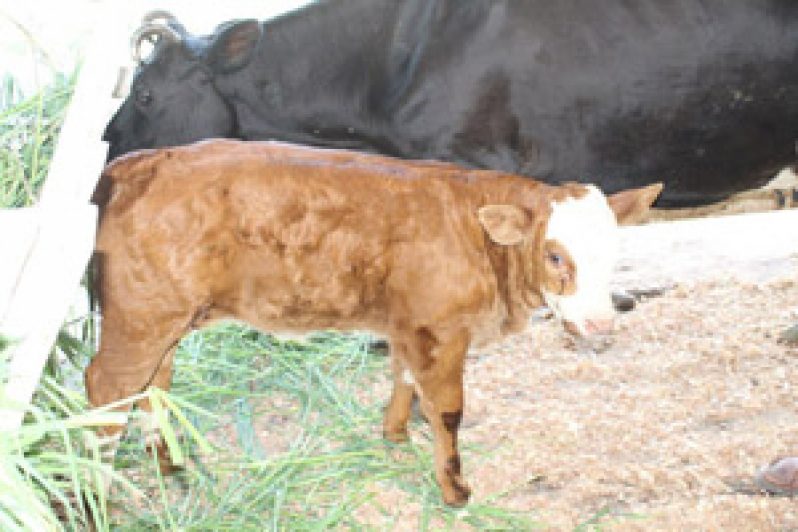THE Ministry of Agriculture, through the Guyana Livestock Development Authority (GLDA), is making significant strides towards improving the local dairy industry with the development of better breeds of animals.
 Representing one of the major pillars in improving the breed of livestock in Guyana are the 15 simmental calves in the country, one of which is being kept at the GLDA farm in Mon Repos, Georgetown.
Representing one of the major pillars in improving the breed of livestock in Guyana are the 15 simmental calves in the country, one of which is being kept at the GLDA farm in Mon Repos, Georgetown.
During a recent interview, Chief Executive Officer of the GLDA, Mr. Dindyal Permaul, advised that these calves were born through an embryo transplant exercise, meaning that the embryos were acquired from overseas and implanted in “surrogate mothers” in Guyana, which carried them to term and subsequently went through a live delivery.
“This surrogate cow is neither the mother nor the father of this calf. This embryo was implanted in this animal. It has a mother and a father that live overseas and that has come from a long line of animals which satisfy the breed characteristics for this animal,” he explained.
Pointing to the surrogate cow being housed at the GLDA farm, he said that the animal has been suitably prepared by veterinarians and other technical officers so that it was able to receive the embryo and carry it to term.
Permaul stated that the main purpose of using this strategy is to quickly improve the breeds of animals, which can then be used to create further cross-bred types of animals that are responsive to the conditions in Guyana.
However, he emphasized that the exercise is not cheap, noting that the embryos are in excess of US $700-800, and that the success rate is not that high.
He stressed that there are problems associated with the technique, some of which were encountered; but nevertheless, there were some successes.
Permaul further pointed out that it is important to improve the breeds of animals because there is a need for animals that can grow fast when taken cared of properly.
“Growth is what we’re looking for, fast growth, efficient growth that can tolerate the kind of conditions that we have here…They require a higher level of management and they present opportunities for our farmers to make a commercial success,” he said.
Permaul also spoke of the artificial insemination (AI) programme, which he said is slightly different from the embryo transplant programme.
He explained that embryo transplant makes use of a female animal with very good genetic characteristics.
“The way of spreading those benefits is to have her produce many eggs and to have those eggs fertilized in a laboratory type situation and to have them stored for use in later implantation,” he stated.
However, he noted that the AI programme makes use of the male animal, “we collect the semen and we’re able to freeze that semen…and extend it to serve several cows…so it multiplies the capacity of the bull.”
Permaul related that these are well used techniques abroad, in all countries that have progressed in animal sciences.
At the moment there are approximately 900 embryos in storage which are being continuously used in a programme which would see the development of more pure bred cows.
Meanwhile, Dr. Robin Austin, who heads the Genetic Improvement Unit of the GLDA noted that these are all techniques of biotechnology.
“The government has given us the go ahead to use them and we have been using biotechnology for a very, very long time,” he remarked.
Dr. Austin related that the ongoing programme has three phases, the first which involves developing a nucleus flock.
This core group of animals will consist of 60 pure bred cows, which were already bought and are expected to arrive in the country shortly. He explained that those would then give offspring which will be shared with the public.
“Everything we’re doing is for the farmers, it has nothing to do with the ministry, it is for the farmers. We are giving you biotechnology so that you can become rich; biotechnology increases human wealth and that is what we’re doing,” he asserted.
Dr. Austin stated that in the first year, 60 offspring will be produced since every cow gives one every 12 months, adding that it will be 30 females and 30 males.
These modern processes of developing better breeds of animals are being undertaken at the Genetic Laboratory in the GLDA compound at Mon Repos. The lab, which was commissioned last year, is a modern state-of-the-art facility with modern technologies and equipment needed to execute such programmes.


.jpg)











